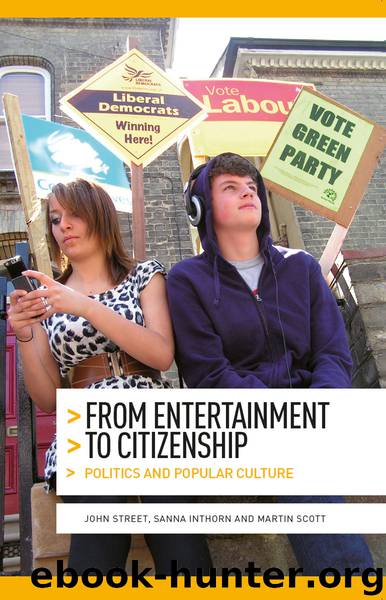From Entertainment to Citizenship: Politics and Popular Culture by John Street Sanna Inthorn & Martin Scott

Author:John Street, Sanna Inthorn & Martin Scott
Language: eng
Format: epub
Publisher: Manchester University Press
The limits of media literacy
The thought that others might be vulnerable to the effects of media, and the way this leads to talk about power and responsibility, does not just apply to the mass of ‘others’. It also applies to our respondents. As we have already seen, they are not always resolute in their media savviness. Young people’s talk about the ‘real’ and the ‘unreal’, and their related use of a media literate discourse, is a claim to media literacy, or agency vis-à-vis the media as a source of power. This is not evidence of media literacy, or an actual position of autonomy. In other words, the fact that young people draw upon critical discourses about the media does not necessarily mean they are immune to media influence (Buckingham 2000: 213). Indeed, we found evidence to suggest that young people frequently appeared to reproduce the discourses sustained in the popular culture texts about which they talked. When discussing television programmes such as The X Factor, The Apprentice and Hell’s Kitchen, young people appeared to ‘buy into’ the wider messages in these programmes about a cruel business world and about the authority that success in the business world conferred on someone. In particular, participants seemed to reproduce discourses that positioned business people in a privileged position of power, as the following focus group extract demonstrates.
A: I love The Apprentice.
C: You actually learn things from that.
A: Exactly.
C: Because it is about business and the ideas.
B: Yeah, you learn different strategies.
A: Yeah, you pick up things.
A: It kind of gets you ready for real life, like when you go and get a job and stuff. You know what to expect from a boss like Alan Sugar. Or someone like that ...
C: Business is harsh, so he needs to be … I think it is good because they will learn lessons, because that is how business really is.
A: I think you need people like him and Simon Cowell. I know it sounds harsh but you have to face reality. If you are not good, you are not good. (Focus group 4)
In such exchanges, all pretence at being media savvy is lost. The shows become ‘life lessons’, based on the harsh realities of the world as it is. Power is revealed and recognised through the window provided by popular culture.
Download
This site does not store any files on its server. We only index and link to content provided by other sites. Please contact the content providers to delete copyright contents if any and email us, we'll remove relevant links or contents immediately.
Supergods by Grant Morrison(1563)
Erotic Comics by Tim Pilcher(1487)
Batman and Psychology: A Dark and Stormy Knight (Wiley Psychology & Pop Culture) by Langley Travis(1321)
The Science of Superheroes by Mark Brake(1321)
100 Sexiest Women in Comics (Comics Buyer's Guide) by Brent Frankenhoff(1231)
Stan Lee by Bob Batchelor(1150)
Avengers Assemble! by Terence McSweeney(1121)
Little Nemo 1905-1914 by Winsor McCay by Winsor McCay(1113)
Disaster Drawn by Hillary L. Chute(1108)
Planet of the Apes by Jim Beard(1104)
The Caped Crusade by Glen Weldon(1096)
Looking for Calvin and Hobbes: The Unconventional Story of Bill Watterson and his Revolutionary Comic Strip by Martell Nevin(1091)
Kirby by Mark Evanier(1085)
Superman: The High-Flying History of America's Most Enduring Hero by Larry Tye(1069)
Sense of Wonder by Bill Schelly(1067)
Comics Art in China by John A. Lent & Xu Ying(1049)
I Find Your Lack of Faith Disturbing by A. D. Jameson(1048)
The Horror Comics by William Schoell(1033)
1,000 Comic Books You Must Read by Tony Isabella(1025)
